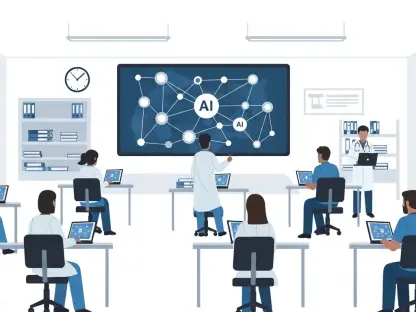The Department of Health and Human Services (HHS) has recently unveiled a comprehensive strategic plan aimed at integrating artificial intelligence (AI) into the healthcare sector. This initiative, announced just before the end of President Joe Biden’s term, outlines both immediate and long-term goals to revolutionize healthcare through AI, covering various aspects including medical research, clinical care, public health, and cybersecurity, among others.
Stimulating AI-Driven Healthcare Innovation
Encouraging Research and Development
HHS’s strategic plan places a strong emphasis on stimulating innovation in healthcare through AI. By increasing grants and funding for AI research, the department aims to foster groundbreaking advancements. Leveraging federal programs to endorse AI and creating dissemination strategies for informing organizational AI investments are key components of this initiative.
These efforts are designed to accelerate the development and adoption of AI technologies in healthcare. Through significant financial support and strategic endorsements, HHS is actively paving the way for pioneering AI solutions that could redefine how medical research is conducted. Furthermore, by providing adequate resources and opportunities, the plan seeks to motivate both established institutions and emerging startups to venture into innovative AI projects, ultimately fostering a culture of continuous improvement and technological progression in the healthcare industry.
Supporting Product Development and Clinical Care
The plan also focuses on supporting product development and clinical care through AI. By establishing guidelines to facilitate the piloting of AI technologies before full implementation, HHS aims to ensure that new tools are safe and effective. This approach not only promotes innovation but also helps healthcare providers integrate AI into their practices more seamlessly.
Through this strategic framework, HHS envisions a healthcare landscape where AI technologies are rigorously tested and refined before being widely adopted. By streamlining the transition from pilot projects to full-scale implementations, healthcare providers can gain confidence in the tools they deploy. Consequently, this step-by-step integration fosters a smoother adaptation period, minimizing disruptions and ensuring that the AI-driven solutions delivered are both reliable and efficacious. By focusing on these crucial phases, the plan actively reduces the inherent risks associated with innovative technology deployment and encourages broader acceptance within the medical community.
Ensuring Ethical and Responsible AI Usage
Addressing Ethical and Regulatory Challenges
A central theme of the HHS AI strategic plan is the commitment to ethical and responsible AI usage. The plan proposes comprehensive guidelines to clarify how current regulations apply to AI technologies. Collaboration with regulatory bodies like the Federal Trade Commission (FTC) is crucial to ensure cohesive implementation and monitoring.
These efforts aim to address ethical, regulatory, and operational challenges associated with AI in healthcare. As AI technologies become more prevalent, it is essential to have clear and consistent guidelines to govern their use. The proposed collaborations and guidelines provide a framework that aligns technological innovation with ethical integrity, ensuring that patient privacy and safety are maintained. By proactively addressing these challenges, HHS is fostering a responsible and trustworthy AI ecosystem where stakeholders can navigate the complexities of AI integration with confidence.
Promoting Transparency and Accountability
To cultivate trust in AI, the strategic plan emphasizes the importance of transparency and accountability. HHS suggests forming internal committees within healthcare organizations to continually assess AI deployments. These committees would focus on factors like transparency, accountability, and risk management, ensuring that AI technologies are used responsibly and ethically.
With dedicated oversight from these internal committees, healthcare organizations can implement robust risk management frameworks to monitor AI applications continuously. This process includes regular audits, transparent reporting, and comprehensive documentation of AI system operations and outcomes. By emphasizing transparency, HHS aims to create an environment where AI technologies are subjected to ongoing scrutiny and performance evaluations. These measures collectively contribute to a higher level of trust among healthcare professionals and patients, reinforcing the ethical foundations upon which AI technologies should be built.
Validating AI Technologies Externally
Establishing Quality Assurance Laboratories
One of the key initiatives under the HHS AI strategic plan is the establishment of a nationwide network of quality assurance laboratories for AI. The Coalition for Health AI (CHAI) plays a crucial role in this effort, working to validate AI algorithms through impartial third-party organizations.
This validation process is essential to ensure the efficacy and safety of AI technologies in healthcare. By engaging independent organizations to rigorously test and validate AI algorithms, HHS ensures that the technologies deployed in the healthcare sector meet the highest standards of reliability and performance. These quality assurance laboratories serve as critical checkpoints where AI tools are examined for potential risks and deficiencies, thereby safeguarding patient outcomes and bolstering the credibility of AI applications in medical settings.
Standardizing Evidence Requirements
The plan also highlights the need for standardized evidence requirements for AI developers. By establishing these standards, HHS aims to enable AI innovations to secure insurance coverage and reimbursements effectively.
This approach promotes the adoption of AI technologies while ensuring they meet rigorous safety and efficacy standards. Standardized evidence requirements provide a clear pathway for developers to follow, ensuring that their innovations undergo consistent and thorough evaluation processes. This not only facilitates smoother integration of AI tools into existing healthcare systems but also enhances the likelihood of receiving financial support and regulation compliance. By adhering to these evidence standards, AI developers can present their products with greater confidence to insurers and healthcare providers, reinforcing the overall trust and reliability of AI solutions in the sector.
Enhancing Healthcare Infrastructure to Support AI
Modernizing Infrastructure
Modernizing healthcare infrastructure to accommodate AI advancements is a focal point of the HHS strategic plan. The department emphasizes the significance of disseminating AI readiness assessments and promoting open-source AI specifications to stakeholders.
These efforts aim to create a robust infrastructure that supports the seamless integration of AI technologies in healthcare. By prioritizing infrastructure modernization, HHS is laying the groundwork for an advanced, AI-ready healthcare system capable of leveraging the full potential of cutting-edge technologies. This involves upgrading existing systems, investing in new hardware and software solutions, and fostering an environment conducive to continuous technological evolution. The promotion of open-source AI specifications further encourages innovation and collaboration within the industry, ensuring that developments are aligned with best practices and widely accessible.
Providing Technical Assistance
To democratize AI technologies and resources, the strategic plan underlines the importance of technical assistance, particularly in under-resourced healthcare settings. Establishing regional technical assistance centers is one strategy to provide tailored support, ensuring these settings can effectively utilize AI.
Additionally, funding initiatives for templates, toolkits for AI impact assessments, and research into best practices are key action points in this plan. By offering comprehensive technical assistance and resources, HHS aims to level the playing field, enabling under-resourced healthcare settings to benefit from AI advancements. This inclusive approach ensures that all healthcare providers, regardless of their resource constraints, have access to the tools and knowledge necessary to adopt AI technologies effectively. The establishment of technical assistance centers provides hands-on support, guiding organizations through the intricacies of AI integration and fostering a culture of shared learning and cooperation.
Equipping the Workforce with Necessary AI Skills
Cultivating an AI-Empowered Workforce
Cultivating an AI-empowered workforce is a core component of HHS’s strategy. Ensuring healthcare professionals have foundational AI knowledge is vital in reducing the costs associated with new tool implementation and optimizing their utilization.
Long-term goals include integrating public education initiatives about AI and incorporating regular AI sessions in mainstream healthcare conferences. These initiatives aim to elevate AI competency levels across the industry, ensuring a more seamless adoption and integration process. By empowering healthcare professionals with the necessary skills and knowledge, HHS is laying the foundation for a workforce that is well-prepared to harness the transformative potential of AI. Continuous education and professional development programs are pivotal in keeping practitioners updated on the latest advancements and best practices, fostering a culture of innovation and adaptability within the healthcare sector.
Developing Training Programs
Developing workforce training programs and studying AI’s impact on the healthcare workforce are essential initiatives under the strategic plan. These programs aim to elevate AI competency levels across the industry, ensuring a more seamless adoption and integration process.
By empowering the workforce with necessary AI skills, HHS aims to create a modern, AI-integrated healthcare system. Training programs are designed to cover various aspects of AI, from basic knowledge to advanced applications, ensuring that healthcare professionals at all levels are equipped to leverage these technologies effectively. Additionally, studying the impact of AI on the workforce allows for a better understanding of how these technologies can be optimized to support rather than displace human workers. This balanced approach fosters a collaborative environment where AI enhances the capabilities of healthcare practitioners, ultimately improving patient care and operational efficiency.
Conclusion
The Department of Health and Human Services (HHS) has recently revealed a detailed strategic plan focused on incorporating artificial intelligence (AI) into the healthcare sector. Unveiled just before the conclusion of President Joe Biden’s term, this initiative sets forth immediate and long-term objectives aimed at transforming healthcare via AI. The ambitious plan addresses various critical areas such as medical research, clinical care, public health, and cybersecurity. By leveraging AI technology, HHS anticipates significant advancements in the efficiency, accuracy, and overall quality of healthcare services. This move underscores the growing importance of AI in solving complex healthcare challenges, such as streamlining administrative processes, enhancing diagnostic precision, and improving patient outcomes. Furthermore, the strategic plan aims to foster innovation and collaboration between public and private sectors, encouraging the development of AI tools that can tackle emerging health threats and secure patient data. This initiative represents a pivotal step towards a more advanced and resilient healthcare system, poised to benefit countless individuals nationwide.









